IGN Editorial Producer, Video Game Devs Call Out Kotaku’s Condescending Dismissal Of Research Done For Call Of Duty Games

Following Kotaku’s recent publication of an article dismissing the work and research done by Sledgehammer Games in service of producing their respective entries into the Call of Duty franchise as nothing more than “a vacation,” IGN Editorial Producer Mark Medina and several professional video game developers have called out the the video game news outlet for its insulting tone and minimization of the developer’s work.
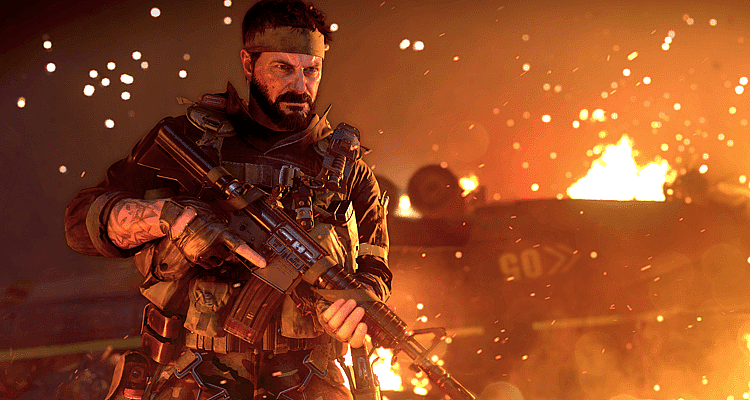
On July 14th, UK-based video game magazine Edge published an interview with Glen Schofield, the former General Manager for Call Of Duty: WWII and Call of Duty: Black Ops Cold War developer Sledgehammer Games, in which he spoke to and detailed “how much work goes into making a Call of Duty game.”
“There’s just a ton of research,” Schofield told Edge. “You’re working with experts – I studied World War Two for three years. I worked with historians. I spent eight days in a van in Europe going to all the places that were going to be in the game. I shot different old weapons. All of these things that you have to do when you’re working on a Call of Duty game.”

Schofield further explained how the team at Sledgehammer Games not only “worked with Navy SEALS and Delta Force people to learn [the] tactics and techniques and get them into the game,” but also learned “about the Special Forces from different countries like England and France and Spain and Italy and all that, because they were all in the game.”
“So, a lot of learning, constantly reading, constantly watching videos and constantly working with experts,” he noted.
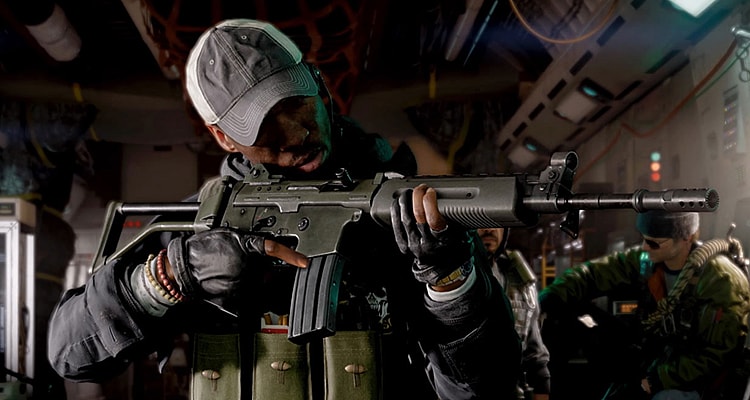
Following the publication of Edge’s interview, apropos of absolutely nothing, Kotaku staff writer Ian Walker authored and published his own disdainful piece on the topic condescendingly headlined, “Call Of Duty Dev: Visiting Europe, Shooting Old Guns Was Hard Work, Y’know,” wherein Walker took massive issue with Schofield’s classification of research as ‘hard work.’
“When the topic of hard work came up, I fully expected him to give a nod to quality assurance or speak on the grueling Call of Duty dev cycle, not ‘reading’ and ‘watching videos,’ as he goes on to explain,” wrote Walker. “While in no way do I intend to diminish the often-overwhelming amount of work that goes into making video games (the majority of which falls to the grunts rather than leadership), what Schofield is talking about here sounds suspiciously like a vacation.”
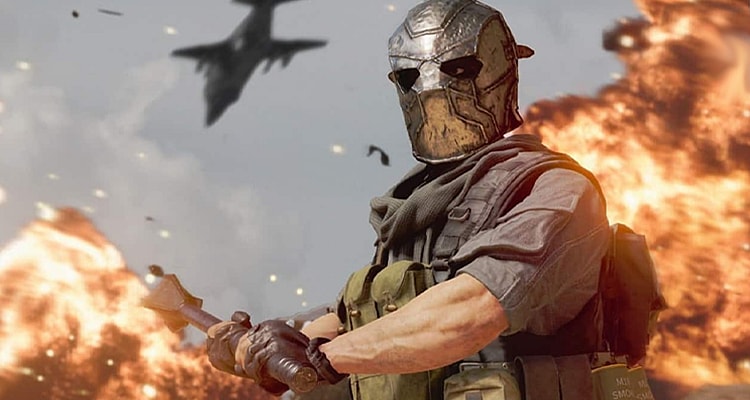
Walker continued, “Sure, it’s probably hard to think of it that way when you’re there for work, but come on. You’re traveling Europe with Activision’s credit card in your wallet, not back in the studio documenting bugs for 12 hours a day at barely more than minimum wage.”
Following a quick mention of Schofield’s new position as Striking Distance Studios’ CEO and its upcoming futuristic horror game The Callisto Protocol, Walker ended his article by taking one last swing at Schofield, self-importantly writing, “There’s no telling what kind of research [The Calisto Protocol] will involve, but it’s sure to be a great deal more intensive than a nice European vacation and firing an M1 Garand or two.”

Soon after Walker’s article went live, it caught the attention of Medina, who took to his personal Twitter account to voice his opposition to Kotaku’s editorial standards.
“Sorry but, f–k this,” said Medina on July 15th. “I spent 4 days with Glen and Michael Condry leading up to the release of CoD: WWII and to say they don’t work hard because it doesn’t fit your definition? C’mon now. Why are we writing hate articles like this? This is the new direction Kotaku was going for?”

“I realize saying ‘spent days with them’ does nothing to prove they actually work hard,” he added. “But the conversations we had showed a true passion in what they were making. It don’t agree with this notion that because someone is able to do something cool, they’re not working hard.”

Medina then countered Walker’s sarcasm with his own, asserting, “With this logic, no one at a major publication is allowed to say they work hard at E3. Major publications pay for their workers to go to E3, hotels and food. Sounds like a vacation right?? So how could they possibly be ‘working hard’?”
“See how dumb that sounds?,” Medina asked in conclusion to his thoughts.

Later that same day, Walker would respond to Medina’s thread by ‘correcting’ his mainstream video games media peer, retorting, “i didn’t say they didn’t work hard, i said it was silly to talk up visiting europe, shooting old guns, and ‘watching videos’ as hard work in the context of the heinous developer exploitation that occurs below his paygrade.”
“Read the blog, Mark,” Walker told Medina.
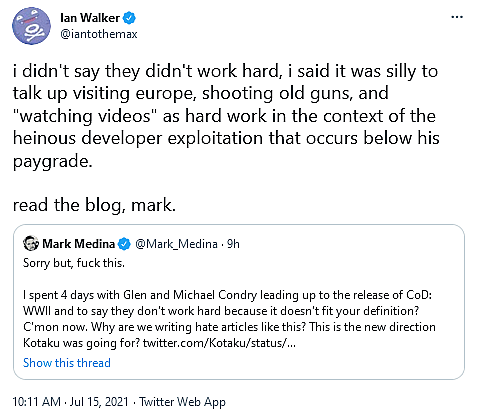
Offering another criticism of Medina’s tweets, the Kotaku writer further wrote, “also, next time you want to pick apart someone else’s work, maybe leave out the part about you being friendly with the subject.”

“But i’m glad you had a good time palling around with glen (who, again, if you had read the blog, is someone i highly respect),” he added. “i’ve held my tongue because ign has hired some great people lately, but glass houses my dude.”
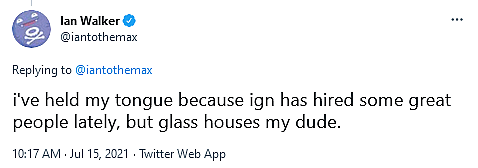
In turn, Medina replied, “I read the blog dude. I didn’t understand the need for it,” before asking Walker, “Who does this article serve?” and asserting that it was “negative for no reason.”
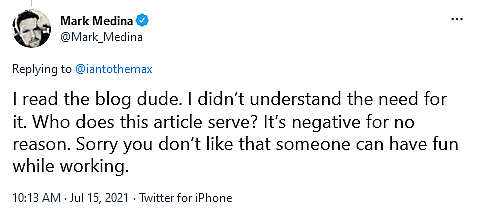
“Sorry you don’t like that someone can have fun while working,” he concluded, explaining, “I think the only case you’d have is if he said ‘I worked harder than everyone else’ which he doesn’t, and wouldn’t say.’”

Medina was not the only one in the mainstream video game industry to criticize Walker’s insulting take on Schofield’s work, as the writer’s dismissiveness was soon met with push back from numerous video game developers
Hilariously, in a textbook example of ‘corn cobbing‘, Walker responded to each of these criticisms with a buzzword-filled tweet accusing each given critic of being in the wrong.
Lead producer for the recently founded Gravity Well development studio Tina Sanchez, whose resume includes credits for God of War (2018) and Apex Legends, posted a photo of herself standing triumphantly amongst an explosives range alongside the caption, “Someone tell Ian Walker I blew up explosives in the desert for a game.”
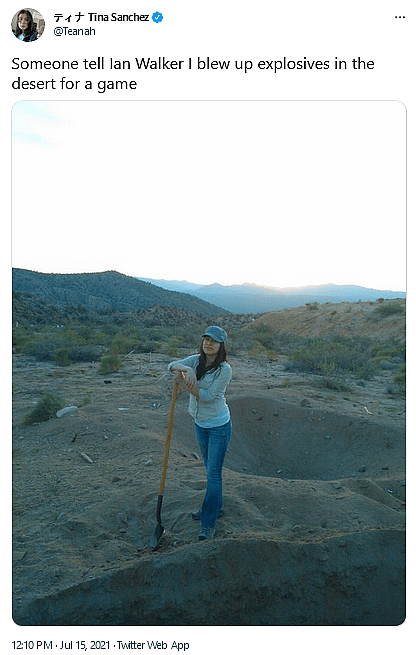
“sucks to see someone like tina, who has gone through her fair share of shit, contribute to the harassment i’m receiving,” responded Walker. “but i guess everyone in game dev has to appeal to the chuds at some point.”
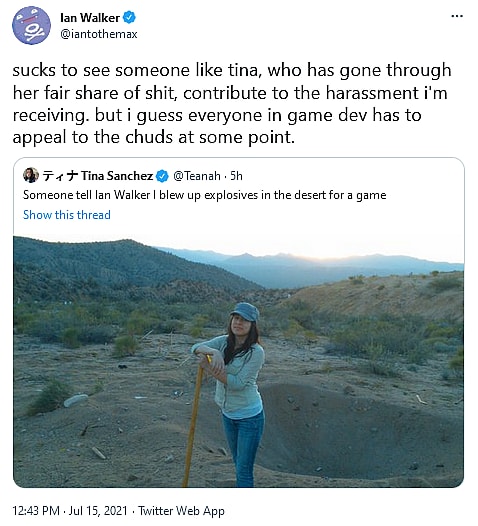
Star Wars: Squadrons and Gotham Knights writer Mitch Dyer opined, “Speculation like ‘this sounds like a vacation’ is classic Toxic Gamer behavior from a major media outlet — and it reinforces harassment developers already receive.”
“This is a blatant misunderstanding of game development, broadcast on a massive scale,” he observed. “This makes my skin crawl.”

Countering with an attempt to flip Dyer’s own words on him, Walker replied, “bad faith criticism like this is classic Toxic Gamer behavior from a major gaming personality — and it reinforces harassment i already receive”.
“this is a blatant misunderstanding of my writing, broadcast on a massive scale,” he finished out his attempt at a ‘gotcha.’ “this makes my skin crawl.”

However, Walker’s own response was itself flipped on him by Ratchet & Clank: Rift Apart writer Sam Maggs, who sarcastically asked the Kotaku writer, “man imagine someone misunderstanding the hard work you do and then broadcasting it to a huge audience??????”
“That sounds like it sucks,” she concluded.

What do you make of the response to Walker’s article? Let us know your thoughts on social media or in the comments down below!
